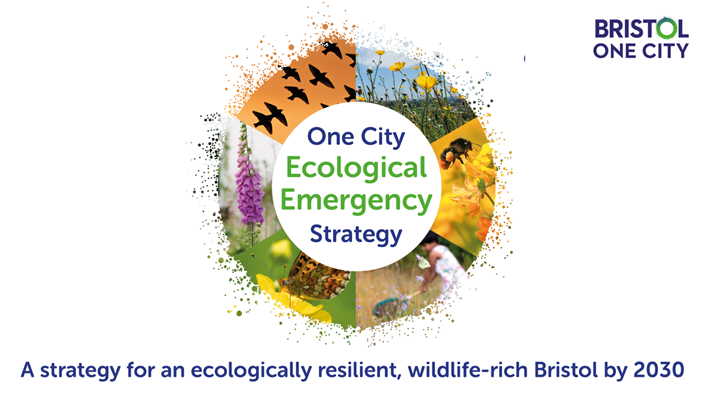Organisations from across Bristol have come together in the first coordinated drive to protect natural life in and around the city.
Following on from the declaration of an ecological emergency in February this year, the One City Ecological Emergency Strategy has been launched. It unveils a 10-year plan to protect wildlife, ecosystems and habitats in the face of the rapid decline in wildlife locally and globally.
A series of discussions have been held this week with city partners to examine the four key areas the strategy covers, which are defined by its goals:
- Space for nature – at least a third of land in Bristol is to be managed for the benefit of wildlife by 2030. This means finding new spaces for nature to thrive throughout the city’s urban landscape.
- Pesticides – reduce the use of pesticides in Bristol by at least half by 2030. This means challenging their use at all levels and finding alternatives.
- Pollution – 100% of Bristol’s waterways to have water quality that supports healthy wildlife by 2030. This means reducing pollution contaminating water.
- Our wider footprint – people and businesses to reduce consumption of products that undermine the health of wildlife and ecosystems around the world. This means finding ways to help everyone better understand the impact of their actions.
The strategy confronts the ecological emergency and puts forward solutions that match the urgency and scale of the issue. It has been developed through the One City Approach, which brings together public, private, voluntary and third sector partners within Bristol, together working to make Bristol a fair, healthy and sustainable city. It builds on successful work to protect nature, but aims to substantially increase the scale and speed of action.
Ian Barrett, Chief Executive of Avon Wildlife Trust and Chair of the One City Ecological Emergency Strategy working group, said:
“It’s not too late to reverse the declines in wildlife that are undermining our planet’s natural life support systems. We know the changes that are needed to restore wildlife and ecosystems and, where they’re in place, they’re working. Over the next ten years, we need to put these changes in place in Bristol and surrounding areas to ensure that people and wildlife can survive and thrive.”
In Bristol good progress has already been made thanks to work with organisations, campaign groups and businesses. From linking local people of all ages with nature through the MyWildCity project, to doubling the city’s tree canopy through Replant Bristol, and building on Bristol Green Capital Partnership’s Our Future vision, which fed into the first One City Plan. The West of England Nature Partnership is also working on a regional ‘Nature Recovery Network’ as part of a national initiative, which supports biodiversity.
Marvin Rees, Mayor of Bristol, added:
“This is our city’s opportunity to come together and take positive action for nature, whilst tackling some of our biggest challenges. We urge everyone in Bristol to reflect on how they can get involved so we can all feel the benefits of protecting our much-loved wildlife and natural spaces. We need to do things differently now to see real changes and it’s vital our actions are fair, just and inclusive. To help spearhead this work at the city council, I have created a new Cabinet Member post for Climate, Ecology and Sustainable Growth with Cllr Afzal Shah taking up the role.”
To read more in the strategy, go to: https://www.bristolonecity.com/wp-content/uploads/2020/09/One-City-Ecological-Emergency-Strategy.pdf

